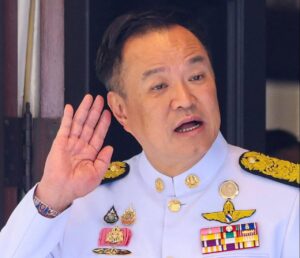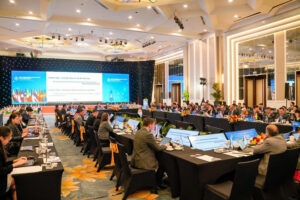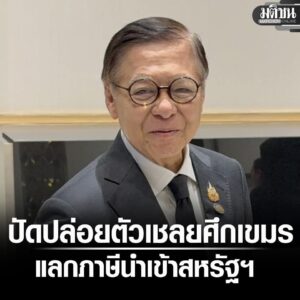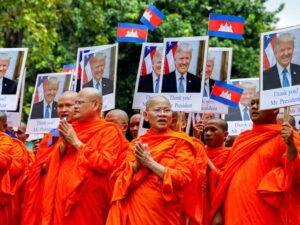Amid Trump turbulence, ASEAN+3 charts Asia’s AI future
In the wake of US President Donald Trump’s trade war offensive, a renewed call for closer cooperation among ASEAN, Japan, China and South Korea — collectively known as ASEAN+3 — is gaining momentum.
In May 2025, the finance chiefs of ASEAN+3 member countries affirmed their commitment to a transparent multilateral trading system to buffer against economic fragmentation caused by Trump’s higher import tariffs.
ASEAN+3’s revival can go beyond achieving reprieve in the short- to medium-term from Trump’s protectionist policies. The current traction offers ASEAN+3 the opportunity to adopt and strengthen strategic resilience amid global systemic shocks stemming from a unilateralist United States, natural disasters and the socioeconomic and technological challenges brought about by artificial intelligence (AI).
Embracing strategic resilience will allow ASEAN+3 to future-proof and withstand regional or international disruptions, balance self-reliance and flexible collaboration while promoting ample space for policy manoeuvring among member nations.
Crisis knows ASEAN+3 by name. The 1997–98 Asian Financial Crisis was the impetus behind its formation, paving the way for the Chiang Mai Initiative — a financial safety net that allows member states access to currency swap lines. ASEAN+3 has served as an important incubator for crisis-response and solutions-oriented mechanisms for East Asia to address systemic catastrophes like natural disasters and the COVID-19 pandemic.
Four mechanisms will generate ASEAN+3’s strategic resilience in the age of AI — partnership, capacity-building, information-sharing and norm-setting. Partnership-building is crucial given that ASEAN+3 member nations are also competing in AI innovation. Implementing industrial and protectionist policies under the guise of economic security can threaten regional AI collaboration.
At the same time, Japan, China and South Korea are ramping up domestic research and development in open-source AI and chip design, while supporting a local start-up ecosystem. In Southeast Asia, Singapore, Malaysia and Thailand are boosting infrastructure capacity to position themselves as viable hubs for advanced semiconductor manufacturing and data centre investments.
To genuinely achieve a collaborative AI ecosystem in East Asia, ASEAN+3 must galvanise partnership-building across government, industry, research institutions and civil society. Setting up an ASEAN+3 AI working group — an adjunct to the ASEAN Committee on Science, Technology and Innovation Plus Three — can facilitate pathfinding exercises to identify comparative advantages among member nations in AI innovation. These can range from compute and infrastructure to data generation, model training and harmonising regulations on data transfer, intellectual property and cybersecurity.
Rather than competing for talent, ASEAN+3 should pursue a regional approach to capacity-building opportunities involving key actors from government, industry and academia. ASEAN+3 can prioritise talent mobility initiatives or vocational training programs under its Cooperation Work Plan 2023–27 that are responsive to a rapidly evolving labour market.
Building on the upward trend of ASEAN tertiary student enrolments in Japan, China and South Korea, ASEAN+3 can explore pilot internship programs among AI-based tech companies. Over the long-term, ASEAN+3 can take insights from the initial successes and challenges of the ASEAN Economic Community in formulating region-wide qualification standards on digital skills to enhance talent mobility.
Information-sharing is integral to enhance ASEAN+3’s resilience in AI development amid the US expansion of export controls targeting Malaysia and Thailand with a view to further curbing Chinese access to advanced AI chips from companies like Nvidia.
Given East Asia accounts for roughly 75 per cent of global semiconductor manufacturing capacity, the timely and rapid exchange of information can reduce the impact of supply chain disruptions due to ongoing geopolitical uncertainty.
ASEAN+3 can promote resilience by institutionalising an early warning or notification system to improve the visibility of supply-chain vulnerabilities in the face of US export policies. The Chiang Mai Initiative may serve as a blueprint in information-sharing for AI innovation and development.
Regular information-sharing can cultivate a more collaborative and predictable business and policy environment within ASEAN+3. This is crucial where pervading zero-sum mentalities can sway countries to focus on industrial development in global supply chains at the expense of building an interoperable regional AI ecosystem.
Achieving strategic resilience in AI development within ASEAN+3 calls for more proactive foresight in AI norm-setting. Cultivating a resilient and sustainable AI ecosystem can only be achieved through mainstreaming inclusive and localised approaches to address digital inequities amplified by AI.
Since November 2024, a wave of homegrown large language models in Southeast Asia such as SEA-LION, SeaLLM v3 and Sailor2 have been utilising local languages in machine translation, voice recognition and sentiment analysis to more accurately reflect cultural and linguistic nuances than Western-centric AI models.
Through their respective tech companies and government-led initiatives, Japan, China and South Korea are actively engaging Southeast Asian start-ups and tech companies to co-develop context-appropriate AI models and applications.
The next step is for ASEAN+3 to set up the proposed AI cross-sectoral working group to consolidate efforts towards co-developing AI models based on the region’s shared cultural identity that privileges community and social harmony.
East Asia faces an increasingly uncertain world undergoing rapid change. The upshot of regional uncertainty is an opportunity for nations to rethink strategic assumptions and reimagine collective collaboration built on strategic resilience.
AI-enabled tools and platforms serve as the test case for ASEAN, Japan, China and South Korea’s resolve in preserving a regional order through consensus and negotiation, rather than through coercion.
Mark Manantan is Director of Cybersecurity and Critical Technologies at the Pacific Forum. He is a member of UNESCO’s AI Experts Without Borders and serves in the institutional advisory board of the ANU Philippine Institute. The views are expressed in this article are his own.
https://doi.org/10.59425/eabc.1756936800
Source: East Asia Forum





